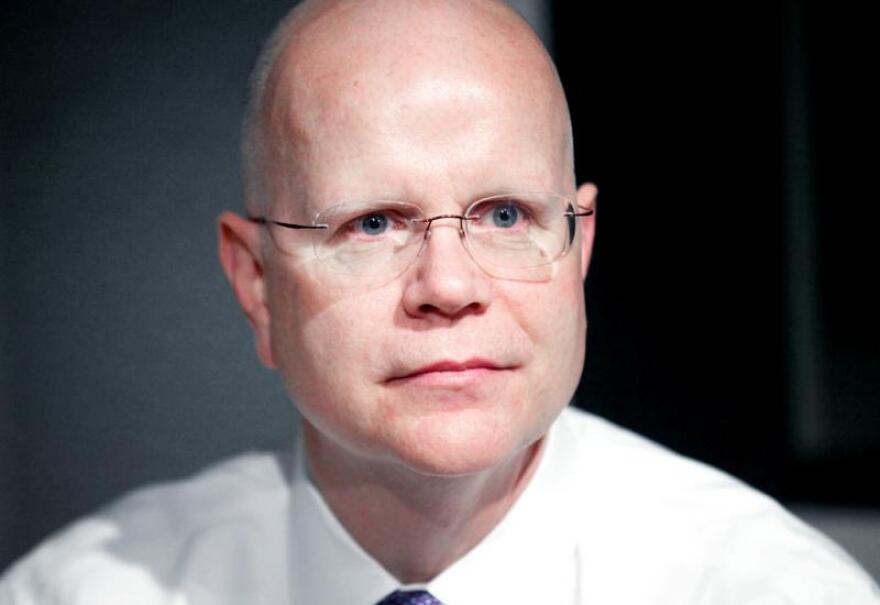Connecticut’s state Capitol is closed for legislative business until at least March 30 because of the new coronavirus. But in the final days before the shutdown, a key committee approved a bill to create a “public option” to compete with private insurers.
The bill would allow small businesses and nonprofits to join a state health plan run by Comptroller Kevin Lembo.
“If there's ever been a question about why we need everyone covered, it should be now,” Lembo told the Connecticut Mirror podcast Steady Habits. “People who ignore symptoms, people who don't have a medical home — it creates real challenges, not only from a payor perspective, but certainly from a health care delivery perspective.”
A similar bill was raised last legislative session, but Lembo said it died after insurer Cigna said such a move would force them to consider leaving the state.
“If folks in the insurance industry, who have had a very good deal for a very long time, can't adapt to change, then that tells us something about them and their ability to anticipate, as Gretzky said, where the puck is going to be versus where it is right now,” Lembo said.
When lawmakers reconvene, the bill heads to the Connecticut state Senate — but faces opposition from Republicans, who’ve raised concerns about risk to the state; and Governor Ned Lamont, who told the podcast earlier this year that the bill doesn’t do enough to address the “underlying costs” of health care.
Listen to the entire podcast episode here, and at steadyhabits.org.
Read highlights from Connecticut Comptroller Kevin Lembo's comments below. They're excerpts from John Dankosky’s interview with Lembo about a public option bill now being considered by the state legislature. The transcript has been edited for brevity and clarity.
On what the coronavirus crisis tells us about the need for a public option:
[It] tells me that we need this more now than ever.
As someone smarter than me said recently, isn’t it interesting that these good public policies that we've been trying to push through for many years, folks are finally starting to realize the importance of a good basis of medical care, a good provider who knows you, and knows how to deal with you, and your symptoms, and your other sort of things you have going on.
So if there's ever been a question about why we need coverage and we want why need we need everyone covered. It should be now people who ignore symptoms, people who don't have a medical home — it creates real challenges, not only from a payor perspective, but certainly from health care delivery perspective.
Lembo on Lamont’s argument that the public option assumes insurers are “bad actors”:
I think it's weak. And the reason I think it's weak is that you have a delivery system of health care that includes who pays and who actually provides the care.
Because if you have $100 and I give you 10 cups that represent pieces of the health care delivery system, and I say, “You've got to take this $100 and put pieces of it in every one of these cups,” who would put more in the insurance cup than they would put in the primary care provider cup or the hospital cup or the preventive medicine cup? No rational person would do that. We have to realign where we invest our dollars.
And if folks in the insurance industry, who have had a very good deal for a very long time, can't adapt to change — part of which we're moving and part of which is happening in a larger system beyond us — then that tells us something about them and their ability to anticipate, as Gretzky said, where the puck is going to be versus where it is right now.
And then you see others, you’ve got to give [Former Aetna CEO] Mark Bertolini, sort of a little credit here because he anticipated a number of years ago that the risk-bearing model that [says], “You know, we're going to make a little bit of money by taking on some risk and then we're going to push payments [to] the doctors,” was a dying model, because more and more of us are going to self-insured programs, and we're doing other things around the delivery of health care.
So he started focusing his attention on what relationship we should be building to really make this a more complete delivery system. What pieces of technology can we invest in to make it easier for people to approach the system? That's the way folks should have been thinking.
When I was an undergrad, I remember people go into the business school and we were all told that these are the captains of industry, the future captains of industry that are going to really lead us. I'm not seeing it and I'm waiting to see it because it has to happen.
Lembo on Lamont’s argument that the public option doesn’t address the underlying medical costs:
That whole idea of assigning bad actors and good actors, that's taking a side, and I think it gives a false impression of what is happening. So I think I'm paraphrasing, but I think one of the things the governor said was nothing that's being done is dealing with the underlying cost of care. I spend every day dealing with the underlying cost of care. I'm engaged in direct negotiation with hospitals for the underlying cost of care. Right now, I'm negotiating for pharmaceuticals in a way that brings our half to the market, but also does it smarter with more accountability, more auditing, making sure we get the best possible deal. That is what deals with the underlying cost of care.
Sometimes elected officials, particularly at the Capitol, seem willing to load up on hospitals, for example, versus insurance companies. They're both really large providers. So if that's your big concern, you need to sort of balance your opinions. But the other difference is that the hospitals are landlocked. It's easy to beat up on them. Are they good actors, bad actors? I don't know the answer to that. They are not a monolith either.
But in my conversations with them going system by system, they want to engage with us around centers of excellence. Who does things well? What can we do around payment reform? So the reason I'm working on that is because hospital CEOs brought that to me and now we're working collaboratively on it. We'll see where it goes. I mean, it's gonna get bumpy at some point, but we're doing a lot around the cost of care.
Lembo on Cigna’s threat to leave the state last year, when another public option bill was being considered by lawmakers:
I had two representatives who were at the Capitol working on this issue throughout. And that conversation happened the night before it all blew up. And I think the actual quote, as relayed to me was, "If you do this” — this being the public option — that that company “would have to reconsider its commitment to Connecticut.”
And I get why legislators and governors across history are made very nervous by a statement like that. But I'll also say that as long as we're held hostage, then we can never actually improve anything because everyone can threaten that. And some are better at threatening it than others and have done it routinely over the years.
There's lots of reasons why this is a great place for these companies to be. I hope they continue to stay. And if they figure out what some companies have figured out — and that is, where things are moving, how do I partner with a big public public entity like us that's doing interesting things — they're going to actually win the day and the book of business.
So, what happened was that statement was made, and then [the message from] a number of legislators and the signals from the governor's office were both the same.
There is not going to be a kumbaya moment around health care reform. Anybody who thinks, I think delusionally, that that's the way this is going to be with the big CEO of the insurance company, and everybody else in the market… it's just not going to happen that way because you're redeploying resources, you're changing the flow and you're putting real competition in a space where folks who claim they want competition want it until they actually get it.
Lembo on Connecticut taking on the risk of insuring more high-risk individuals under his plan:
So [when] I look at the risk profile of the people we're talking about, small businesses, nonprofits and… they look a heck of a lot like the state employees that I'm already buying coverage for. And in the case of small businesses, generally speaking, [they] are a better risk than state employees. So that actually helps them.
There's been some concern about… cost to the state, because this all ties intimately together. Yeah, if we get all the bad risk, if we get people washing their bad risk through us, that's a significant problem. But there are ways that we can create risk corridors to keep the state safe from excess loss. That would help to make this a manageable risk to the state.
But — at the same time — [it should] reflect what must be at the basis of all this. And that is, are we in this together or are we not? Because we have come to believe that it's every man or woman [for] themselves when it comes to health insurance. And God bless if you're healthy and you get employer-sponsored coverage and if you don't, "Oh, well, so sorry." That's not OK. It's not OK. We are all in this together.







